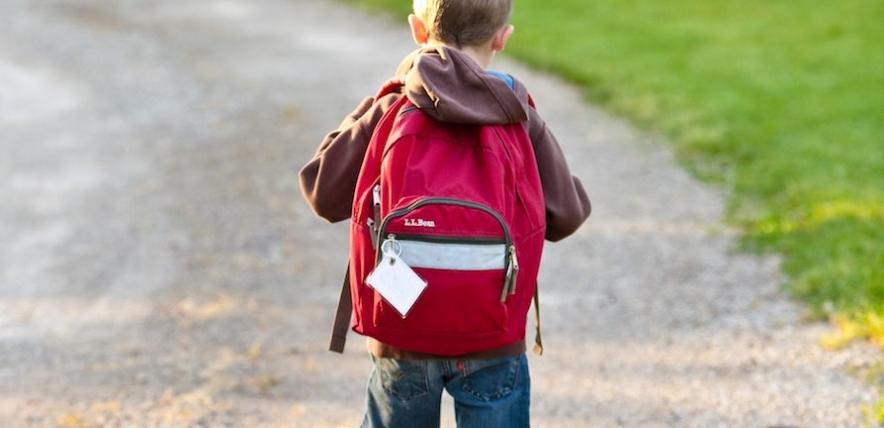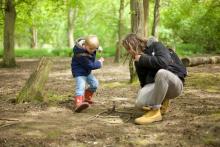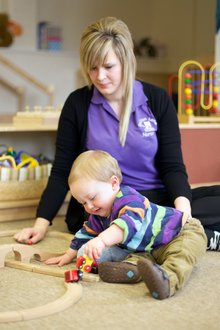As September approaches, your child may be getting ready to leave their nursery, childminder or you and starting their official school journey. But how can you help your child prepare for this important step?
The move from pre-school to 'big school' is an important one in the life of all children and their parents and carers.
Many children are absolutely bursting to get there, but others might be feeling a bit apprehensive.
There are lots of things you can do at home to help your child prepare and be raring to go – and we’re not talking about drilling them daily with flashcards and sudokus!
Readiness for school is more about preparing your little one for the social, emotional and communication challenges that they are going to face, and helping them with some simple skills that will make their journey that little bit easier.
Remember too that the transition to big school is a process which starts in the days and weeks before the first day of term and continues until your child feels confident and settled in their new school.
The importance of communication skills
One of the things your child will have to do when they start school is follow simple instructions. You can prepare for this – and we don’t mean just by ordering them around! Make it fun, and come up with some games.
These skills take time to develop so if your child is starting school very soon do not feel that they need to be able to follow complex instructions and have highly detailed conversations before their first day at school.
The games can be used to support your child develop through the first few weeks of starting school. Your child’s teacher will be skilled and experienced with four-year-olds so is unlikely to have unrealistic expectations about little children sitting still, listening to complicated instructions and so on.
- Encourage your child to follow instructions: This could be fetching you something from the house or garden, drawing you a very simple picture, or helping to tidy away toys. Raise the stakes gradually over time by moving on to two instructions, then three, and seeing if your child can follow them in order.
- Encourage detail in conversations: Choose simple everyday objects and ask your child to tell you what colour it is, what size it is, and what it’s for. You can turn this into a game, for example: choose 5 -10 everyday objects (some of which are similar) and lay them out on a tray or the floor. Take turns to secretly choose one but leave it with the other objects. Describe your chosen object to see if your partner guess what object has been chosen.
- Play more describing and guessing games: For example, each person has to think of an animal, then describe it in three words or sentences - and everyone else has to guess the animal. So a giraffe might be tall, long-necked, and munchy, while a chicken is wings, peck, and eggs!
Practise developing children's physical skills
- Dressing — When your child gets to school, it’s really helpful if they can dress and undress themselves, as they will be changing to do PE, putting on aprons for painting and crafts. Encouraging your child to put on their own clothes in the morning or pyjamas in the evening with lots of praise. Playing dressing-up games will help your child practise putting clothing on and taking it off.
- Buttons and zips — It is also handy if your child can do up their own coat, whether that be doing up buttons or a zip. These are tricky skills that require fine motor skills, so don’t get too anxious if your little one can’t master it – of course teachers and teaching assistants will always be around to help. But it’s still good to practice, and starting with bigger buttons and chunky zips can help.
- Shoes — These can be tricky, and not all pre-schoolers will be able to do them up, but you can help by choosing shoes with Velcro rather than laces – tying laces is a skill that will come much later. Buckles can be quite fiddly too but are easier than tying laces. Encourage your child to put on their own shoes, even if they can’t do them up. Finding ways of helping your child know which shoe goes on which foot is useful too – so buckles are always on the outside or ‘the red stripes always touch when you put your feet together’.
Boosting their social skills
If your child has been attending pre-school, they’ll already have lots of experience of group activities and joining in. Of course, inviting other children of their age to your home to play will help encourage sociability, but social skills also involve things like being able to take turns, being kind to others and helping people – all of which you can practise together at home.
- Board and card games: encourage turn taking, and also help your child adjust to dealing with making mistakes or losing a game – this is important, because learning new things doesn’t always mean success first time - and they won’t always win!
- Role playing: When you and your child play with figures or animals, steer the play towards scenarios that they might encounter in the playground, such as inviting a dinosaur who’s been left by himself to join in a game. Be sensitive to the scenarios your child is presenting as these may provide hints about things the child is finding challenging
Learning important emotional skills
Children pick up cues about how to respond to life changes from the adults in their lives, so it’s important that you don’t express any negative feelings you might have about your own school days.
Steer away from referring to ‘work’ when talking about the activities your child will be doing, and try to focus on all the fun that they will have and the new friends that they will make.
Many parents find their child’s first day at school is an emotional day as their ‘baby’ is growing up and becoming independent. It is important that you do not show your child that you are feeling upset so talk to adults close to you to help you through this period of change.
You’ll learn the name of your child’s new teacher at any introductory sessions you and your child attend – be sure to use positive language when you discuss him or her, focusing on how much they are looking forward to getting to know your child and find out how great they are.
It’s tempting to use the prospect of starting school to try and encourage good behaviour; this isn’t a problem if it’s done positively – for example, say things like ‘won’t your teacher be impressed when he finds out how good you are at getting your own socks on,’ rather than negative comments such as ‘your new teacher will be very cross if you don’t share nicely when you get to school.’
Books about starting school
Enjoying books together about starting school can help your child understand that this is something that everyone goes through, and might bring help address some of the questions and worries that you hadn’t previously thought of.
I am too absolutely small for school by Lauren Child
Come to school too, Blue Kangaroo! By Emma Chichester Clark
And at the end of the day…
Starting big school is exciting, stimulating and an adventure. Show interest in what your child has done at school but try to avoid too many questions – your child will tell you about the day in their own time. Your little one is likely to be exhausted at the end of the day so you may need to change the evening routine a little to accommodate a tired, hungry four-year-old.
Further resources and support
BBC - Preparing for primary school
National Autistic Society - Starting or switching school
NHS - Advice about school if your child is autistic
Sense - SEND support in schools
Where next?
How do I make separating from my toddler easier?
6 ways to help your child develop a growth mindset







